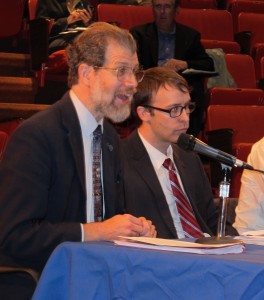Former DEP Official Says State Lacks in Air Quality Enforcement
-
Susan Phillips

Susan Phillips / StateImpactPA
Kevin Stewart (L) with the American Lung Association testifies at the hearing on air pollution and natural gas.
Up until two weeks ago, George Jugovic led the Department of Environmental Protection’s southwest regional office. On Wednesday, Jugovic told lawmakers at a hearing in Delaware County that his air quality managers were “crushed” by the volume of air emission permit requests. That increase in permits comes from Marcellus Shale natural gas drilling operations, which require the use of combustible engines to extract the gas, and push it through pipelines.
Jugovic testified at a Democrat led hearing on the impact of natural gas drilling on air pollution. He says within the last year, in the southwest region alone, his department issued permits for the release of 13,000 tons of nitrogen oxide related to the Marcellus Shale industry. Nitrogen oxide creates ground level smog. Companies requested the permits for compressor stations, which are needed to pump the gas through distribution pipelines.
Those compressor stations can use either electricity, natural gas, or diesel to power their engines. But Jugovic says the DEP’s rules regarding the cleanest available technologies are 10 years old.
“The department should be ensuring that every new internal combustion compressor engine installed in Pennsylvania incorporates current best available control technology to protect public health and the environment,” said Jugovic.
Electricity is the cleanest, followed by natural gas, and diesel, which is the worst polluter. Jugovic says the difference between the cleanest and the dirtiest technology is significant. And, he notes gas drilling is the second largest source of nitrogen oxide pollution in the state. The largest source is coal fired power plants.
Jugovic served in the DEP under four governors, starting with Governor Richard Thornburgh. He is now working for the environmental advocacy group Penn Future. He said current DEP Secretary Michael Krancer should require industry to use the “best available technology.”
Andrew Paterson, Executive Vice President of Technical Affairs with the industry group, Marcellus Shale Coalition, said many producers are already using the cleanest machinery and techniques to extract the gas. Paterson also confirmed that there is a backlog of air emission permit requests with the department for compressor stations.
But the DEP exempts some parts of the Marcellus drilling process from oversight. Environmentalists testified that those exemptions make sense for conventional drilling, but not the Marcellus Shale. Joe Osborne is the Legal Director for GASP, or Group Against Smog and Pollution. He said Marcellus Shale wells have more of an impact on air pollutions.
“Marcellus wells produce larger volumes of gas, production is more equipment intensive,” says Osborne,” said Osborne. And a single Marcellus well site includes multiple wells.”
Osborne said more than 1500 well pads are exempt from Pennsylvania’s air quality permits.
That means regulators don’t have information on the gas industry’s cumulative contribution to air pollution. Kevin Stewart is the director of environmental health for the American Lung Association in Pennsylvania.
“Already we’re playing catch-up because the Marcellus industry has been working on this for years,” said Stewart. “We don’t have the basic inventory information to know what’s being emitted, what are the controls and how strongly can we control this in the future.”
Former DEP secretary John Hanger testified that a program put in place under Rendell would have helped fund the air quality division. But Governor Tom Corbett cancelled the planned air permit fee structure.
In written testimony, DEP chief Michael Krancer said his department is working to update the air quality regulations relating to natural gas drilling. In a recent letter to the editor, Krancer defended his agency’s current ability to oversee the oil and gas industry.
















